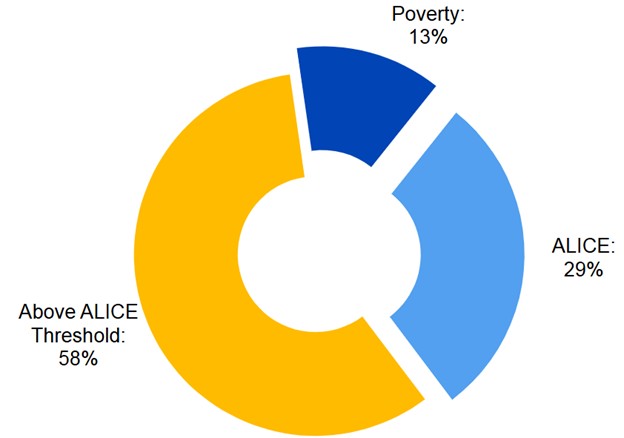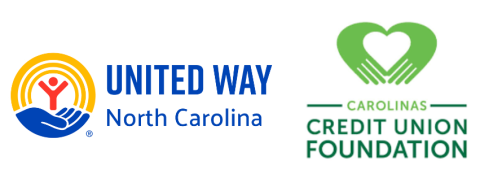
A.L.I.C.E. Asset - Limited - Income - Constrained - Employed
Do you know ALICE?
WHO IS ALICE?
In 2023, according to the Federal Poverty Level (FPL), 13% of North Carolina households were financially insecure. Yet this measure failed to account for an additional 29% of households that were also experiencing financial hardship. These households are ALICE: Asset Limited, Income Constrained, Employed — with income above the FPL, but not enough to afford basic expenses in the county where they live.
Between ALICE households and those living in poverty, an estimated 42% of households in North Carolina were below the ALICE Threshold in 2023. Households below the Threshold are forced to make impossible choices — like deciding whether to pay for utilities or a car repair, whether to buy food or fill a prescription.
Households below the ALICE Threshold are in every state and county across the U.S. and represent all demographic groups. Workers below the ALICE Threshold often perform the jobs that keep our economy functioning smoothly — they are child care providers, food service workers, cashiers, personal care aides, delivery drivers, and more. Their stories capture the systemic and structural barriers to financial stability, and the struggles and resilience of families experiencing financial hardship.
Key Findings from the ALICE Report
United For ALICE calculates the cost of household essentials for each county in North Carolina. These costs are outlined in the ALICE Household Survival Budget, and include housing, child care, food, transportation, health care, and technology, plus taxes and a 10% miscellaneous category. The Survival Budget is tailored by location, household size, and composition. Total costs are then compared to household income to determine how many households in each county don't earn enough to cover the basics. (Learn more about our Methodology here).

Financial Hardship: Of North Carolina's 4,352,607 households in 2023, 13% earned below the Federal Poverty Level (FPL), and 29% were ALICE — households that earned above the FPL, but not enough to afford the ALICE Household Survival Budget for their household composition and location. Combining these two groups, 42% of households in North Carolina were below the ALICE Threshold.
The Cost of Basics: In North Carolina, average basic costs in the ALICE Household Survival Budget were $30,336 for a single adult and $80,232 for a family of four with two adults and two children in child care — much higher than the FPL ($14,580 for an individual and $30,000 for a family of four). Basic costs varied substantially by county. Compare Costs Over Time with the ALICE Essentials Index.
ALICE Demographics: There are households below the ALICE Threshold across all demographic groups in North Carolina. However, certain groups are disproportionately represented due to systemic racism, ageism, gender discrimination, and geographic barriers that limit many families' access to resources and opportunities for financial stability. ALICE Data is available by race/ethnicity, age of householder, and household composition. It is also available by County Subdivision, ZIP code, and Census Designated Place, as shown in the County Reports. See all available geographies on the ALICE Mapping Tool.

ALICE in the Labor Force: Of the 20 most common occupations in North Carolina, 15 paid less than $20 per hour in 2023. And of all workers in the top 20 occupations, 35% lived in households below the ALICE Threshold.
Trends in Financial Hardship: The number of ALICE and poverty-level households in North Carolina has changed over time as household economic factors change and as people move into and out of the state.
Indicators of Well-Being: Exploring ALICE data alongside other related datasets can reveal potentially powerful connections between financial hardship and other indicators of well-being.
Data Notes: The income data used in this Report rely on U.S. Census Bureau American Community Survey (ACS) estimates. The ACS is based on a representative sample of housing units and people; therefore, these estimates have a degree of uncertainty. Some data points are geographic averages, others are one- or five-year averages depending on population size (these are reported in the Data Sheet). Percentages are rounded to whole numbers, sometimes resulting in percentages totaling 99% or 101%. ALICE analysis includes households regardless of work status, as employment is fluid and most households have members who are working, have worked, are out on disability, or are looking for work. ALICE analysis includes families and roommates but does not include people who are unhoused or living in group quarters (such as college residence halls, skilled nursing facilities, and military barracks).
ALICE Activities
United Way of North Carolina has several activities you can model with your team or individually to better understand what it means to be ALICE and what types of challenges ALICE faces on a day to day basis. To access these activities, contact Sally Gordon, Director of Mission Advancement, at sgordon@unitedwaync.org.
ALICE is brought to North Carolina by: United Way of North Carolina and Carolinas Credit Union Foundation.

